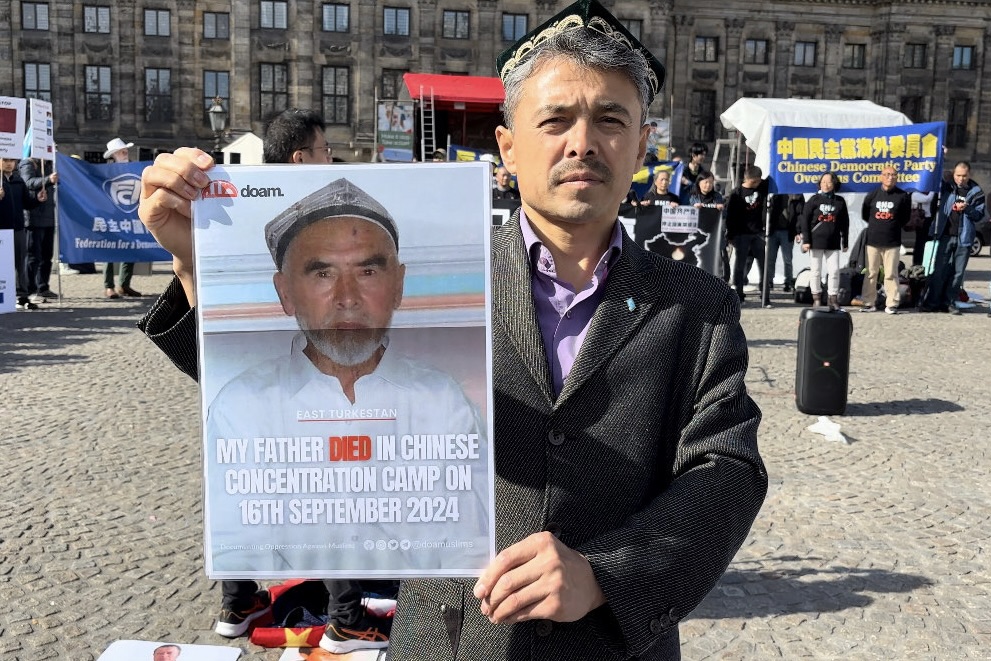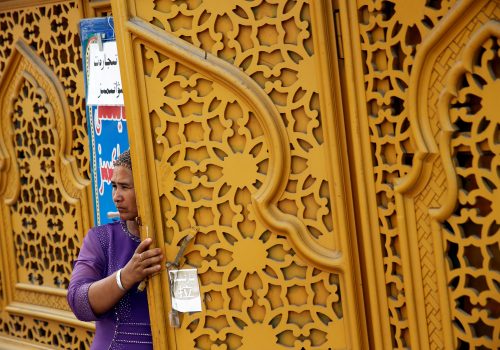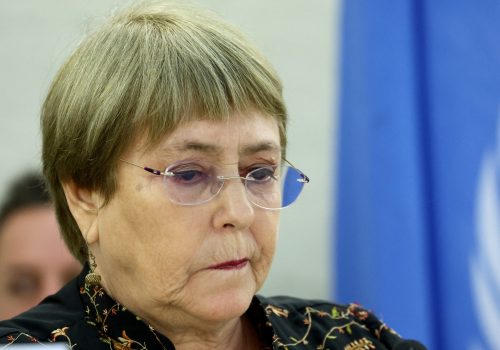China’s atrocity crimes in Xinjiang are entering an even darker phase. The UN must act.
While the world’s attention has turned to the devastating conflict in the Middle East, Russia’s ongoing war of aggression against Ukraine, and other global crises, the suffering of the Uyghur people in China’s Xinjiang Uyghur Autonomous Region is accelerating. In late October, a Chinese state-run news outlet released what it called a documentary but was in fact an atrocious propaganda video. In this video, two Uyghurs, Gulmira Imin and Zulpiqar Rozi, were forced to confess to a crime they almost certainly did not commit. Forced confessions are a routine tactic employed by the Chinese government against Uyghur political prisoners. Imin and Rozi had been detained in the aftermath of the July 5, 2009, Uyghur uprising, and for almost fifteen years it was not known what had happened to these political prisoners. As a more well-known political prisoner, Gulmira is listed as a prisoner of conscience by the US Congress’s Tom Lantos Human Rights Commission. Then suddenly, they appeared on camera, ostensibly blaming outside forces for the Chinese government-manufactured human rights violations that resulted in the student-led uprising. The years of torture they had endured since they were detained were visible on their faces, hair, and teeth due to the horrific conditions in the camps.
This video is just the latest example of the Chinese government’s brutal treatment of Uyghurs. My colleague Alyssa Johnson and I have prepared a forthcoming report to the United Nations (UN) documenting an array of horrors, including deaths, torture, arbitrary detention, enforced disappearance, and the newly imposed illegal financial penalties on prisoners’ families as a form of extortion. Our report also details forced labor, transnational repression, continuous violations of reproductive rights, and assaults against human rights defenders, among other offenses. Our work bears witness to the dark history unfolding in our time.
When atrocities persist, they risk becoming tragedies that the world feels powerless to change.
In the face of genocide and grave human rights violations, the Uyghur people have demonstrated extraordinary courage, resilience, and an unwavering commitment to peace. From the brave survivors to families of those who fell victim to the camps, the Uyghur community stands as a testament to grace and unity in the most trying of times. Yet, despite their strength, the global community and the UN system have failed to protect them.
For nearly a decade, Uyghur advocates, myself included, have pushed the UN and governments across the world to address China’s crimes against humanity and genocide against the Uyghur people. After two years of engaging with China on its terms, on August 27 of this year, Volker Türk, the UN high commissioner for human rights, issued an update on the ongoing human rights crisis in Xinjiang. The update merely confirmed what was already known—that despite requests from the UN, the Chinese government has refused to allow authorities any meaningful access to the region. This statement builds on the 2022 landmark report by the Office of the UN High Commissioner for Human Rights (OHCHR), which alleged that Chinese government policies targeting the Uyghurs and other Turkic peoples in Xinjiang may amount to crimes against humanity. The recommendations made in this report urged China to engage with and facilitate further visits by the OHCHR. However, in subsequent engagements with the UN and member states, the Chinese government has presented a deceitful image of its policies in Xinjiang, deliberately concealing the atrocity-torn region where Uyghurs and other ethnic groups remain in mass incarceration.
Today, after nearly nine years since China initiated its policy of mass detention of Uyghurs in Xinjiang, Beijing’s atrocities against the Uyghur people have entered an even darker phase. China is further escalating the use of its authoritarian penal system to imprison people, with at least half a million Uyghurs imprisoned as of 2022, according to the Chinese government’s own data (with 2022, 2023, and 2024 data missing due to public scrutiny indicating that the real numbers are much higher). In an August report that I co-authored with Min Kim for the Yale Genocide Studies Program, we conducted a statistical analysis of Uyghur imprisonment rates based on the Chinese government’s own data. Despite Uyghurs comprising less than 1 percent of China’s population, they account for 34 percent of the country’s incarcerations, marking the world’s highest rate of ethnic imprisonment. Our analysis estimates that, if left unchecked, China’s atrocities will strip 4.4 million years of life from my proud community.
An investigation by researcher Nyrola Elimä and journalist Ben Mauk, published in the New York Times in November, uncovered the alarming extent of China’s international reach, as it targets Uyghurs who have fled its oppressive regime. In cooperation with Thai authorities, the Chinese government has forcibly repatriated—in overt violation of international law—hundreds of Uyghurs who sought asylum in Thailand. The UN Refugee Commission failed them after their brave escape. Dozens died. Today, more than sixty Uyghurs remain detained in Thailand under dire conditions, awaiting an uncertain fate.
This situation calls for urgent international attention and action, as reports coming out of camps in Xinjiang are increasingly alarming. One such example is the Netherlands-based Uyghur activist Abdurehim Gheni, whose brothers, niece, and dozens of other relatives are in the camps. The Chinese government temporarily released Abdurehim’s father, Abdugheni Hudaberdi, to pressure him into refraining from testifying at an international tribunal hearing examining China’s human rights violations. When Abdurehim refused to comply with their request, his father was taken back to the camp, where he tragically passed away two months later in government custody. There is a saying in Uyghur that when someone passes away before they can see someone who they longed for, the person leaves this world with their eyes wide open. Abdurehim’s father left this world with his eyes open.

When thinking about such cases, my brother, Ekpar Asat—an award-winning entrepreneur and alumnus of the US State Department’s exchange program—comes to mind. He has been unjustly imprisoned for eight years and eight months. I can hardly fathom what he endures each second in that prison. But Ekpar is not alone; there are countless others like him languishing in those cells. This reality leaves me, and others who care about the Uyghurs, no room to dwell in pain—we must channel it into action.
When atrocities persist, they risk becoming tragedies that the world feels powerless to change. But the Chinese government’s crimes against the Uyghurs are not just tragic facts—they are deliberate acts of ethnic cleansing, crimes against humanity, and genocide. The world cannot remain passive. Above all, the UN has a responsibility to act on the recommendations it has put forward and to demand accountability.
The United States, too, will have a major role to play in ensuring accountability for China’s crimes against the Uyghur people. As the incoming US administration assembles its team of experts on China, I hope that the plight of Uyghurs will be placed at the center of US diplomacy with Beijing. At the Asia-Pacific Economic Cooperation meeting in Lima, Peru, last week, Chinese leader Xi Jinping outlined four red lines for the United States, one of which was democracy and human rights—a pointed message to the incoming Trump administration not to press Beijing on these issues. The United States must respond decisively: These red lines for Xi are the foundations of the United States’ core values that define its global leadership. Along with more decisive action from the UN, US leadership and initiative on China’s human rights violations against the Uyghur people will be essential to hold Beijing accountable for its crimes.
Rayhan Asat is a senior legal and policy adviser and China Project lead at the Atlantic Council’s Strategic Litigation Project.
This article is dedicated to the legacy of the late Felice Gaer, a distinguished former UN expert and steadfast champion of the Uyghur people’s rights.
Further reading
Tue, Dec 21, 2021
The US can lead the way to ending China’s modern slavery. My brother is counting on it.
New Atlanticist By Rayhan Asat
Moral arguments have been unable to sway global firms—so it’s time for the full force of the US government to step in.
Sat, Jun 18, 2022
Why I expected more from the UN human-rights chief
New Atlanticist By Rayhan Asat
Michelle Bachelet was supposed to fight for imprisoned Uyghurs like my brother. But she failed.
Fri, Oct 18, 2024
Capture the (red) flag: An inside look into China’s hacking contest ecosystem
Report By
China has built the world’s most comprehensive ecosystem for capture-the-flag (CTF) competitions—the predominant form of hacking competitions, which range from team-versus-team play to Jeopardy-style knowledge challenges.
Image: Security cameras are installed above the perimeter fence of what is officially known as a vocational skills education centre in Dabancheng, in Xinjiang Uighur Autonomous Region, China September 4, 2018. This centre, situated between regional capital Urumqi and tourist spot Turpan, is among the largest known ones, and was still undergoing extensive construction and expansion at the time the photo was taken. Picture taken September 4, 2018. To match Special Report MUSLIMS-CAMPS/CHINA REUTERS/Thomas Peter


